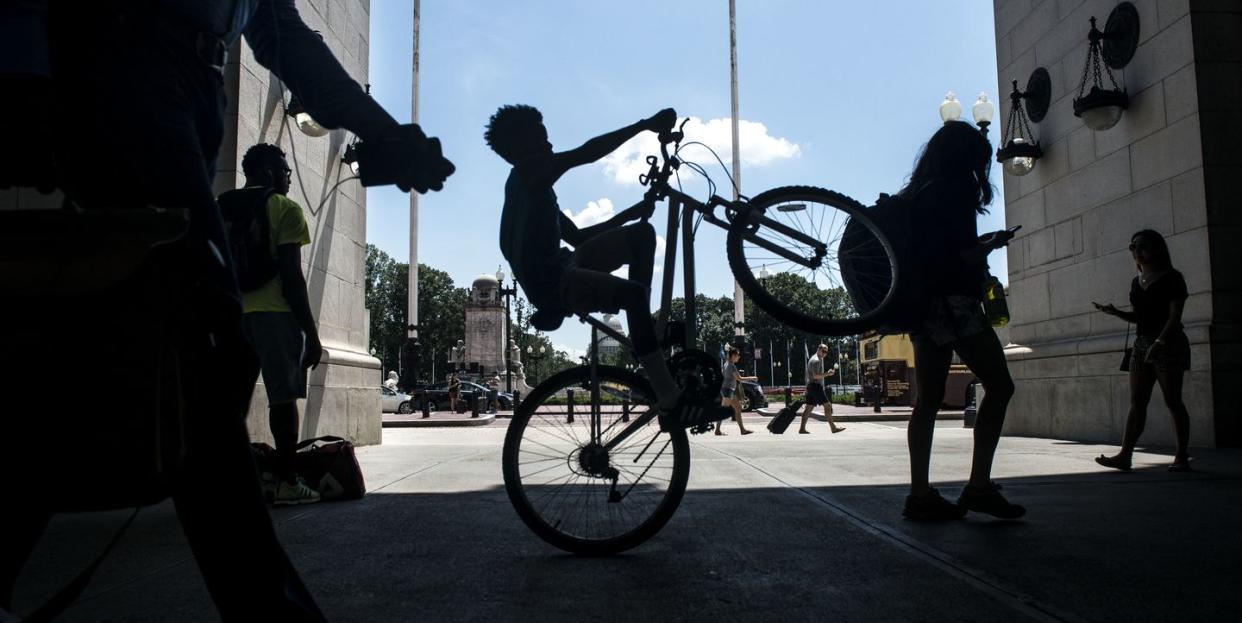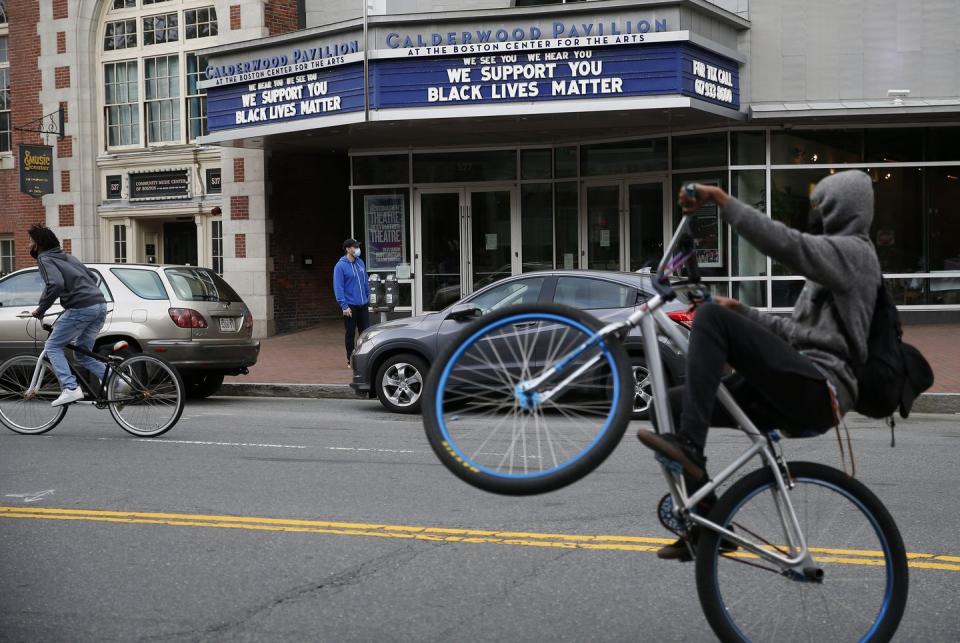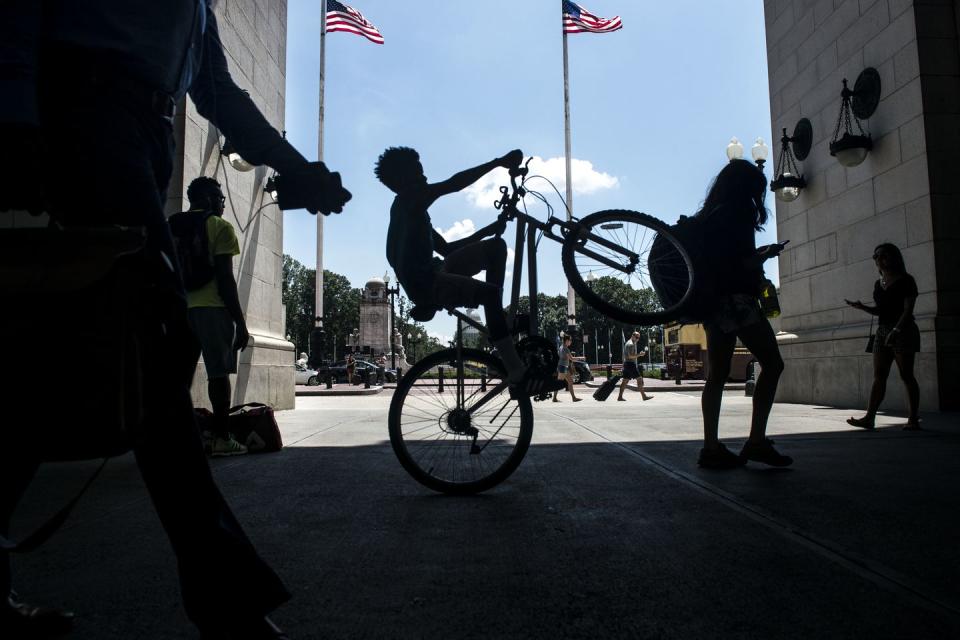To Some People, the Idea or the Sight of Wheelie Kids Is a Threat

Last month I watched and rewatched the 17-minute video of kids riding through Perth Amboy, New Jersey, that had been circulating in social media. A group of young cyclists had gathered for the same reason all cyclists get together—to have fun. There is video of the riders casually rolling down the street and through parks, taking water breaks for themselves, and stopping at a corner store to pass out water bottles to those who didn’t have any, all the common rituals that happen throughout all disciplines of cycling. The plot takes a turn when a Perth Amboy squad car flashes its lights on the group for a reason that cannot be determined in the video. Upon briefly detaining a handful of the riders, one of the officers inquires about the registration of the cyclists’ bikes. The conversation escalates and concludes with one of the few adults (who was all of 18 years old) being put in handcuffs. (He was later released).
To some people outside of “the Culture,” the idea or the sight of wheelie kids is a threat. It’s a threat to their idea of what cycling is, or a threat to the idea of where or maybe even how Black and Brown kids should be able to express themselves. Historically, there have always been efforts to limit cultural expressions when it comes to people of color. Do you really think the police would have asked for Viola Brand’s bike registration if the renowned artistic cyclist was stunting down the street? In a sport that trumpets an ethos of freedom, that idea is not widely received by those outside the community.
Watch the video of Perth Amboy cyclists here:
Since when do riders need a bike license? And since when does a bike need to be registered? I’m more familiar with the latter question, but the fact is that nobody’s bike is registered. And if bikes are registered, considering the rate at which bikes are stolen and never recovered, what’s the point of enforcing the registration of a bike? These are formalities more than laws, and in the case of the Perth Amboy officers, it was the best shitty excuse they could come up with to teach these kids a lesson.
I’m no stranger to public displays of wattage. For years before the pandemic, every Wednesday and Saturday I participated in a 60-plus-rider ritual known as “race ride.” This is a standing group ride that takes place rain or shine, come hell or high water. Both days use the same route, which leaves from Fairfax, CA, and snakes out onto country roads and through small towns. Eventually the group loops back into downtown Fairfax, the most quintessential town of Marin’s community and culture. At times we’ve been instructed by the highway patrol to ride single-file down the single-lane roads, but we have never once been asked to provide proof of registration for our bikes, a law that is left to each municipality to enforce. We’ve never been harassed any more than a “please follow the rules” statement. I’ve heard and witnessed road cyclists yell at officers and express their annoyance. Never once has that escalated into an arrest or seizure of property.

When I think about those wheelie kids in New Jersey and the groups I’ve ridden with throughout my life, there is no difference in our pursuit of happiness. We are equals. So why does this group of kids doing wheelies get harassed and/or penalized more than the standing group ride that is as predictable as the sunrise? It’s not that Black people don’t ride bikes because, ahem, I’m Black. I will say that these mobs of kids and young adults tend to be more melanated than your average Saturday peloton.
Seeing any rider performing a one-footed, one-handed wheelie catches my attention. I am in awe of their pure talent, not to mention their ability to amass a group of equally talented friends to parade down the street showcasing their skill. But to others this is a threat. A threat to the idea of what cycling is or a threat to the idea of where Black and Brown kids should be able to express themselves. And let’s be honest, cycling is not the first image of Black and Brown joy that comes to mind for those who feel challenged that cycling isn’t just a gang of white engineers, doctors, and successful businesspeople with too much time on their hands.

Wheelie kids are a booming group in the cycling community, but this group is by no means a new phenomenon. When I was a kid, doing wheelies exclusively throughout the neighborhood was a rite of passage. In my early years I grew up in a predominantly Black neighborhood, and I couldn’t earn my stripes unless I could wheelie. Since the ’90s and even before, the culture of fixie kids and wheelie kids has continued to merge, and the stylings of stunting on a bike have evolved into the acrobatics we’ve become familiar with today. It’s a bicycle trick. It’s not a signal of status, education, religion, or caste. Furthermore, it’s not a threat to the culture of cycling. It is a discipline on its own with its own community, its own rituals, and its own history, and it doesn’t have to conform to the mainstream idea that cycling is men in spandex on high-priced machinery. It is simply a celebration of culture.
The most extreme reactions come from the most extreme contradictions to what we perceive to be true. So when I see those Jersey kids getting pulled over for simply riding their bikes and the only excuse for why an 18-year-old’s bike had to be seized was “he didn’t have a bike license,” I can’t help but wonder: How come this doesn’t happen to me when I’m blocking the roads in large groups? Where are the five cop cars to give out a warning or impose their authority? Why does my bike registration not get questioned? Sometimes it happens because you’re Black. Other times it’s because of the Blackness, or lack thereof, in the space where you’re operating. If I’d had my road bike with those kids, I too would have been harassed. And if one of those kids had had their SE Big Ripper with the peloton, regardless of how amazing that feat is on its own, that kid would not have had any issues even if we were to get pulled over.
“Space” in terms of social context matters. A lot of people haven’t been given the space in the world of cycling to enjoy themselves as others enjoy the liberty and freedom that we speak of so often with regard to cycling. The times have to change.
You Might Also Like

